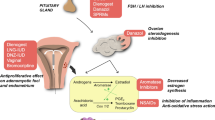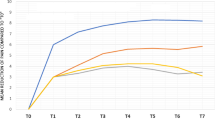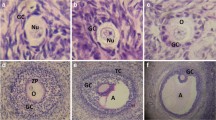Abstract
Objective
To compare the clinical effect of Chinese medicine (CM) and Western medicine (WM) for controlling the recurrence of pelvic endometriosis after a conservative operation.
Methods
The study was a multi-center, randomized, parallel controlled and prospective clinical trial. Patients were randomly divided into two groups: CM group (106 cases) and WM group (102 cases). Drugs were given to patients during 1–5 days of the first menstruation after a conservative operation in both groups. Patients with stages I and II (revised American Fertility Society) were treated for 3 months, while the patients with stages III and IV were treated for 6 months. The patients in the CM group were treated using three types of Chinese herbal medicine based on syndrome differentiation. Patients in the WM group were treated using gonadotropin releasing hormone agonist (GnRH-a) or gestrinone. Patients treated with GnRH-a received add-back therapy of Tibolone Tablets once a day after 4 months of treatment. Any cases of dysmenorrheal chronic pelvic pain, menstruation and any adverse reactions of patients were recorded once a month during the preoperative and postoperative periods and once every 3 months during the follow-up period. During the preoperative, postoperative and the follow-up periods, patients underwent type B ultrasonography of the pelvis and measurements of serum CA125 levels, gynecologic examination, routine evaluations of blood, urine, hepatic function (glutamate pyruvate transaminase), renal function (blood urea nitrogen) and electrocardiograms. During the follow-up period they underwent type B pelvic ultrasonography, measurement of serum CA125 levels and further gynecologic examinations. The two treatments were compared for clinical recurrence rates, pregnancy rates and the incidence of adverse reactions.
Results
The incidence and timing of recurrence of endometriosis were not significantly different between the two groups. The first pregnancy achieved by the patient in the CM group was significantly earlier than that in the WM group (P <0.05). Moreover, the incidence of adverse reactions in the WM group was significantly higher than in the CM group (P <0.01).
Conclusions
Treatment with Chinese herbal medicines prevented the recurrence of endometriosis after a conservative operation, improved the conception rate and showed fewer and lighter adverse reactions than did treatment with WM therapy. Treatment with Chinese herbal medicine meets the need of patients wishing to have a child following endometriosis and is an appropriate form of clinical treatment.
Similar content being viewed by others
References
Giudice L, Kao L. Endometrosis. Lancet 2004;364:1789–1799.
Garry R. The effectiveness aflaparoacopic excision of endometrisis. Curropin Obstet Gynecol 2004;16:299–303.
Lang JH. Notes of gynecological surgery. Beijing: China Science and Technology Press; 2004:99.
Liao LJ, Chen JL. Reoperation for postoperative recurrence of endometriosis. Chin J Prim Med Pharm (Chin) 2005;12:1020–1021.
Lang JH. Manual on the diagnosis and therapy of endometriosis. China Med Tribune (Obstetrics Gynecol ed) 2006-06-08.
Cao ZY. Chinese obstetrics and gynecology. 2nd ed. Beijing: People’s Medical Publishing House; 2004:1477–1529.
Ministry of Health P.R China. Guidance principle of clinical study on new drug of traditional Chinese medicine. 1st ed. 1993:267.
Zhang YZ. Gynecology of traditional Chinese medicine. Beijing: China Press of Traditional Chinese Medicine; 2002:133.
Zheng XY, ed. Guiding principle of clinical research on new drugs of traditional Chinese medicine. Beijing: China Medic-Pharmaceutical Sciences and Technology Publishing House; 2002:243.
Hu YC. Comparitive study on the efficacy of severe endometriosis after laparoscopic surgery treated with different drugs. J Pract Med (Chin) 2008;24:3741–3743.
Jee BC, Lee JY, Suh CS, Kim SH, Choi YM, Moon SY. Impact of GnRH agonist treatment on recurrence of ovarian endometriomas after conservative laparoscopic surgery. Fertil Steril 2009;91:40–45.
Loverro G, Carriero C, Rossi AC, Putignano G, Nicolardi V, Selvaggi L. A randomized study comparing triptorelin or expectant management following conservative laparoscopic surgery for symptomatic stage III–IV endometriosis. Eur J Obstet Gynecol Reprod Biol 2008;136:194–198
Porpora MG, Pallante D, Ferro A, Crisafi B, Bellati F, Benedetti Panici P. Pain and ovarian endometrioma recurrence after laparoscopic treatment of endometriosis: a long-term prospective study. Fertil Steril 2010;93:716–721.
Rickes D, Nickel I, Kropf S, Kleinstein J. Increased pregnancy rates after ultralong postoperative therapy with go in releasing hormone analogs in patients with endometriosis. Fertil Steril 2007;78:757–762.
Zhang L, Qu XD, Jing FR. Comparison of clinical effect of different drugs in treatment of endometriosis after laparoscopy operation. Chin J Clin Pharm (Chin) 2010;19:205–207.
Chen F, Ma CL. GnRH-a in treatment of endometriosis research progress. Chin J Birth Health Heredity (Chin) 2011;19:167–169.
Author information
Authors and Affiliations
Corresponding author
Additional information
Supported by the Key Projects of the National Science and Technology Pillar Program during the 11th Five-Year Plan Period (No. 2006BA104A)
Rights and permissions
About this article
Cite this article
Zhao, Rh., Hao, Zp., Zhang, Y. et al. Controlling the recurrence of pelvic endometriosis after a conservative operation: Comparison between Chinese herbal medicine and western medicine. Chin. J. Integr. Med. 19, 820–825 (2013). https://doi.org/10.1007/s11655-012-1247-z
Received:
Published:
Issue Date:
DOI: https://doi.org/10.1007/s11655-012-1247-z




